
Related
Guests
- Heber Brownpastor of Pleasant Hope Baptist Church and member of Baltimore United for Change.
- Billy Murphyattorney for the family of Freddie Gray. He won a $6.4 million civil settlement with Baltimore City for the family in Gray’s death.
A Baltimore police officer has been acquitted on all charges for his role in the arrest of Freddie Gray, who died of spinal injuries last year after he was arrested and transported in a police van. Officer Edward Nero faced misdemeanor charges of second-degree assault, reckless endangerment and two counts of misconduct in office. Nero was one of six officers charged in Gray’s death. Judge Barry Williams handed down the verdict in a bench trial on Monday, ruling that “the state has not met its burden” to prove Nero’s guilt “beyond a reasonable doubt.” The ruling was met with little surprise from the community in a case that many said was the state’s weakest. We speak with Gray family attorney Billy Murphy, who recently won a $6.4 million settlement from the city of Baltimore for the family of Freddie Gray, and Rev. Heber Brown III, pastor of Pleasant Hope Baptist Church and member of Baltimore United for Change.
Transcript
AMY GOODMAN: We begin today’s show in Baltimore, where a police officer was acquitted on all charges for his role in the arrest of Freddie Gray, who died of spinal injuries last year after he was arrested and transported in a police van. Officer Edward Nero faced misdemeanor charges of second-degree assault, reckless endangerment and two counts of misconduct in office. A total of six officers were charged; four were directly charged in Gray’s death. Judge Barry Williams handed down the verdict in a bench trial Monday, ruling “the state has not met its burden” to prove Nero’s guilt “beyond a reasonable doubt.” The ruling was met with little surprise from the community in a case that many said was the state’s weakest; however, a few protesters gathered outside the courthouse and expressed disappointment in the verdict.
PROTESTER: This is not right. That boy’s back got broke. He’s dead. If something happened to my son, I would put myself in that mama’s shoe and that family’s shoe. That is not right. That verdict is not correct. He should have gotten something. Somebody got to be responsible for that murder.
AMY GOODMAN: Freddie Gray died in April from a spinal injury sustained while being transported in the back of a police van. Gray’s family and attorney say his voice box was crushed and his spine was, quote, “80 percent severed at his neck.” Nero was one of six officers charged in Gray’s death. Officer William Porter was the first one to go to trial, charged with involuntary manslaughter, second-degree assault, reckless endangerment and misconduct in office. In December, Judge Williams declared a mistrial in Porter’s case after jurors were unable to reach a verdict on any of the charges after three days of deliberation. Now all eyes are on the upcoming trial of officer Caesar Goodson, the driver of the police van and the only officer charged with murder in Gray’s death.
For more, we’re joined by Gray family attorney Billy Murphy, who recently won a $6.4 million settlement from the city of Baltimore for the family of Freddie Gray. Also with us is Dr. Heber Brown, pastor of Pleasant Hope Baptist Church and member of Baltimore United for Change.
We welcome you both to Democracy Now! And I want to begin with Pastor Heber Brown. Your response to the acquittal?
REV. HEBER BROWN III: Well, as you said, Amy, it is no surprise to those of us who recognize that justice in the courts, especially for black folk in this country, is oftentimes more marathon than sprint. And so, people here are looking at ways to continue organizing in our local communities. We’re not waiting with bated breath for the decision of any judge or jury to determine what justice looks like or should look like in our communities.
AMY GOODMAN: Billy Murphy, you’re the attorney for the Gray family. What was their reaction?
BILLY MURPHY: Their reaction was the same as it was to the hung jury and to the run-up to these trials, and that is that justice didn’t have a word “guilty” attached to it, or “not guilty.” Justice is the result of a fair process where both sides present all of their evidence, and the judge makes as fair a ruling as he’s capable of doing by applying the law and finding the facts. And as long as that was done, the family is satisfied, because they didn’t put their fingers on the scale here. They didn’t think in advance, “I want that officer to be found guilty.” Rather, they let the system do its job. And they had confidence in the system, because they had a black judge who was exceptionally qualified because he was a former prosecutor of police misconduct for the federal government for six years. And they believed that both sides were capable of presenting their case, and they left it up to that designated representative of our community, Judge Williams, to make the decision.
Now, it would be different if there was a lack of confidence in him as the process, but so far the community is exceptionally happy with Judge Williams’s handling of these cases. And they have full confidence that he’s able and willing to administer justice. He also showed the community that he wasn’t willing to be swayed by any segment of the community in determining for himself whether or not, based on all the evidence, the officer was guilty or not guilty. And for that, we all applaud him, because judges should be above the pressures of the community. And this is our turn to put the pressure on the system. And we don’t want to be in a position where that pressure causes a miscarriage of justice; rather, we want everybody to play their normal role in the normal fashion, with exceptional people in charge of the decision.
AMY GOODMAN: After the not guilty verdict was handed down in the case against Officer Nero, Baltimore Bloc, a grassroots social justice coalition, tweeted, quote, “We do not believe it was Mosby’s intent to seek justice for Freddie Gray; truly doing so would mean upsetting the status quo in which she is all too comfortable, and it would mean risking her office’s relationship with the corrupt and brutal Baltimore Police Department. The type of illegal arrest that led to Freddie Gray’s death is the same type of arrest that leads to Mosby’s office prosecuting people like Freddie Gray every day.” Pastor Heber Brown, your thoughts?
REV. HEBER BROWN III: Well, I think that is an example of the growing discontent with not only the legal system, but all the systems here in Baltimore. Mr. Murphy is a expert jurist here and has knowledge of the inner workings of how the legal system works. But for everyday people, for laypeople like myself who don’t have that level of expertise, there is a great frustration with the pace of this case and the results of the case, as well, especially when you consider, Amy, that those who were charged in vandalizing stores were convicted with a great, deliberate speed, but it seems like those who were involved or connected in the death of Freddie Gray, the process slows down to snail’s pace.
And so I think that statement is an example of what I spoke of earlier, that people more and more are saying, “Enough with looking to the legal system or to City Hall to provide justice for us. We can work ourselves.” And so, with Baltimore United for Change, we are involved in organizing and building for power. And what that means on the ground is establishing black-led organizations, supporting black-led organizations, from public policy think tanks to freedom schools to solidarity economies and cooperative economics, to even an alternative food system. We are taking the role and responsibility to define what justice should look like for us, instead of waiting for these systems to tell us what justice should look like.
AMY GOODMAN: While none of the six officers have yet to be found guilty in the death of Freddie Gray, Allen Bullock, an 18-year-old who turned himself in for participating in last year’s uprising, pleaded guilty in February. He agreed to a deal that included a 12-year prison sentence with all but six months suspended, five years’ probation after serving that term, 400 hours of community service, and he has to earn his high school equivalency certificate. Bullock had faced a bond of half a million dollars, higher than any of the officers. This is Allen’s stepfather, Maurice Hawkins, and his mother, Bobbi Smallwood, last year speaking to The Guardian.
MAURICE HAWKINS: That’s my son on top of the police car with the cone in his hand, hitting the window. We don’t condone that, and we believe in peace. I just want justice to be held and not to be—you know, him looked at as a career criminal or a thug.
BOBBI SMALLWOOD: My son, he’s not a evil child. I mean, he’s not somebody that go around and just hurt people. He’s really not. He was really upset about them police who’s just walking free. You gave my son a half-a-million-dollar bail for breaking a police window, and you gave these cops nothing? Nothing for murder? That’s crazy. That’s crazy. That’s not fair.
MAURICE HAWKINS: That’s not justice.
BOBBI SMALLWOOD: That’s not fair.
AMY GOODMAN: Gray family attorney Billy Murphy, your response?
BILLY MURPHY: I think they have a legitimate grievance. And I think that there is disparity in the system for bail. I think judges are more afraid than ever not to give these ridiculously high bails, which are totally unjustifiable. Neither the officer nor this kid deserved a bail anywhere near that. And indeed, you could make an argument that both should have been released on their own recognizance without having their families burdened by the bail system, where they no longer have the resources left to hire a lawyer after they get the person out on bail. This has been a problem for a long time, and we’ve fought hard against it. Many of us got together to help professor—a professor at the University of Maryland to assure that lawyers are present at bail hearings, because up until last year, it wasn’t done in Maryland. So there are lots of problems with this criminal justice system that make the outcomes in many of these cases, far too many, totally unfair. And I agree with everything she said. But I don’t think it’s one or the other. I think both were inappropriately—bails were set inappropriately in both cases. Why a million-dollar bail for a police officer who’s not going anywhere? There’s no place for him to go. And he’s not going to commit a crime while he’s out on bail, because he’s not even on duty. Why a bail so high for a kid like this in an incident that’s seemingly so minor? Why so high a suspended sentence, when the mother’s point of view and the father’s point of view are correct? And until we straighten out this excessive sentencing and these excessive bails, this system will be far from fair, not only to black people, but to poor people across the country, and especially in Maryland, which is a progressive state, relatively speaking. So, there’s a lot of work to do on this system. And the reforms are nowhere near complete.
AMY GOODMAN: Pastor Brown, I wanted to get your response to Gene Ryan, president of the Baltimore City Fraternal Order of Police, who issued a statement Monday in response to the Nero verdict. He said in part, quote, “Officer Nero is relieved that for him, this nightmare is nearing an end. Being falsely charged with a crime, and being prosecuted for reasons that have nothing to do with justice, is a horror that no person should ever have to endure. … None of these Officers did anything wrong. The State Attorney’s office responded to the riots and violence in Baltimore by rushing to charge these Officers rashly and without any meaningful investigation.” Pastor Brown, your response?
REV. HEBER BROWN III: Yeah, well, the nightmare continues for black people in Baltimore. The nightmare has been generations long. I mean, everybody knows the name of Freddie Gray now. People don’t know the name of Thomas Broadus, a black man killed by a Baltimore City police officer in the 1940s. Many of you don’t know the name of Tyrone West, a black man killed by 12 to 15 Baltimore City police officers just a couple of years ago. And so, you know, while he might be glad that the nightmare is over for Officer Nero, we’re living in a nightmare. When you have one in four Baltimoreans living in a food desert; when you have young people who go to schools that have lead in the pipes, in the water, so they can’t drink from the water fountains; when you have unemployment, record unemployment highs; when you have developers who get tax breaks from City Hall while our communities are suffering and falling apart, our nightmare continues and will continue. And we’re not waiting anymore for any Wizard of Oz in City Hall or anybody else to do for us. I am a part of a growing group of people who have a frustration with the system as it stands, are not waiting around, but are using what God has given us to build the systems and structures that we need and build for power in Baltimore, because waiting for any of these systems is not going to work.
BILLY MURPHY: And by the way, we both speak from experience, personal experience, with the system. I was brutalized and arrested, in the process of the arrest, brutalized by being thrown face-first into a set of lockers by an officer in Anne Arundel County, who arrested me for nothing, pure spite because of my aggressive representation of someone in front of a commissioner. Fortunately, I was acquitted. But I had to hire a lawyer, and I had to fight against that unfair and unnecessary charge against me. Incidentally, instead of my being released on my own recognizance, the commissioner put a $5,000 bail on me. And I asked her, “Why did you do that? You know I’m a lawyer. I’m not going anywhere.” She said, “Frankly, Mr. Murphy”—a white woman—”Frankly, Mr. Murphy, I think you’re a danger to the community.” Well, you know, there it is. Black lawyer. What other danger do I present?
AMY GOODMAN: Last year I spoke to Kevin Moore, who lives in the Gilmor housing projects, actually filmed part of the arrest of his friend, Freddie Gray. Moore talked about the relationship between the community and the police.
KEVIN MOORE: I’ve been through so much personally in my life in West Baltimore. It’s just a hard place to grow up in, you know? And basic survival is all we concentrate on, you know? So, in light of that, it’s like, what do you do when you’re placed in a position where you have people that are supposed to come and serve and protect in the police, right, but you can’t trust them because they brutalize people, they hurt people, they dehumanize people? You know what I’m saying? And it’s very belittling to me when you say we’re supposed to trust you, when you can come out with the police bill of rights and protect these animals from the very laws that they break. It’s amazing to me.
AMY GOODMAN: Pastor Heber Brown, your response, as well as, as we wrap up on this issue, what the schedule is now of the trials, and what is happening in the community?
REV. HEBER BROWN III: Yeah, well, we’re continuing to organize in the community. We’re continuing the tradition of what our ancestors and elders have always done. They’ve created spaces and institutions to advance what they feel to be their priorities and to address the material conditions of their communities, from the Mississippi Freedom Democratic Party to the Black Panther survival programs to the Freedom Schools of 1964. We come from a long tradition of people who find creative ways to address our material conditions. That will continue. We’ll continue to observe and keep eyes on what’s going on in the legal structure, but, as I said earlier, we are not holding our breath in Baltimore. We’re going to continue to organize within our communities on solidarity economies, freedom schools, public policy think tanks, alternative food systems and so much more, to do for ourselves, because, as Maya Angelou said, when people show you who they are, believe them. We believe that this system is wicked and immoral and grossly and woefully deficient, and we will not wait anymore for it to provide for us what we know we have the right to.
BILLY MURPHY: And I agree 100 percent with everything he’s just said. Don’t let the smile fool you.
AMY GOODMAN: Well, finally, Billy Murphy, I wanted to ask you about a different issue, the issue of Flint, Michigan. In February, you brought a federal class action lawsuit against state and local officials in Flint over lead contamination of the city’s drinking water. Can you tell us the state of this class action suit, who you’re representing and what you expect to come out of it?
BILLY MURPHY: Yes, we filed a class action suit in Flint, Michigan, to get a—it was a simple suit—to get a refund for all of the water bills that had been paid for the two years that that water was undrinkable and otherwise unusable. Absolutely fair case. We brought it under the federal Constitution, because we alleged that the government interfered with the contract that the citizens of Flint had with their city, that the water would come from the Detroit, Michigan, source, which was clean, and instead the special manager out there, who took over the entire government by governmental fiat, switched the water supply on the citizens without making the proper precautions, making that water undrinkable. And so, that’s the suit that we filed in Michigan.
AMY GOODMAN: Well, I want to thank you both for being with us. Again, Billy Murphy is the attorney for the Gray family, for Freddie Gray’s family, who was killed in April of 2015 in police custody. Six police officers are on trial. One had a mistrial. Now another has been acquitted. And because—with the mistrial, there are still five trials to go. Also, Billy Murphy is representing the class action suit dealing with the contamination of Flint’s water supply. And, Dr. Heber Brown, thanks so much for being with us, pastor at the Pleasant Hope Baptist Church in Baltimore.
This is Democracy Now! When we come back, we’ll talk about Honduras. Who’s been arrested for the death of the world-renowned environmentalist Berta Cáceres? Stay with us.

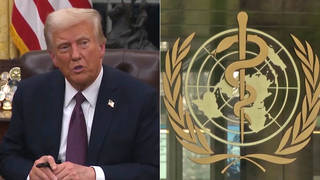
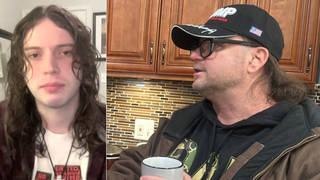
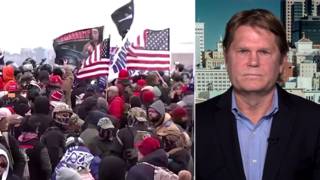
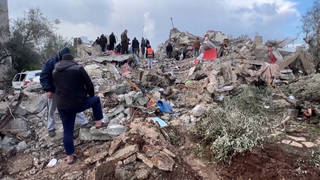





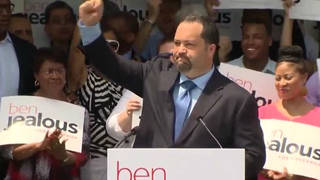
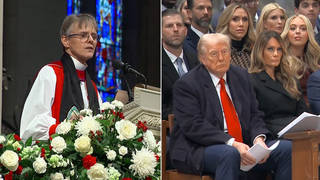
Media Options